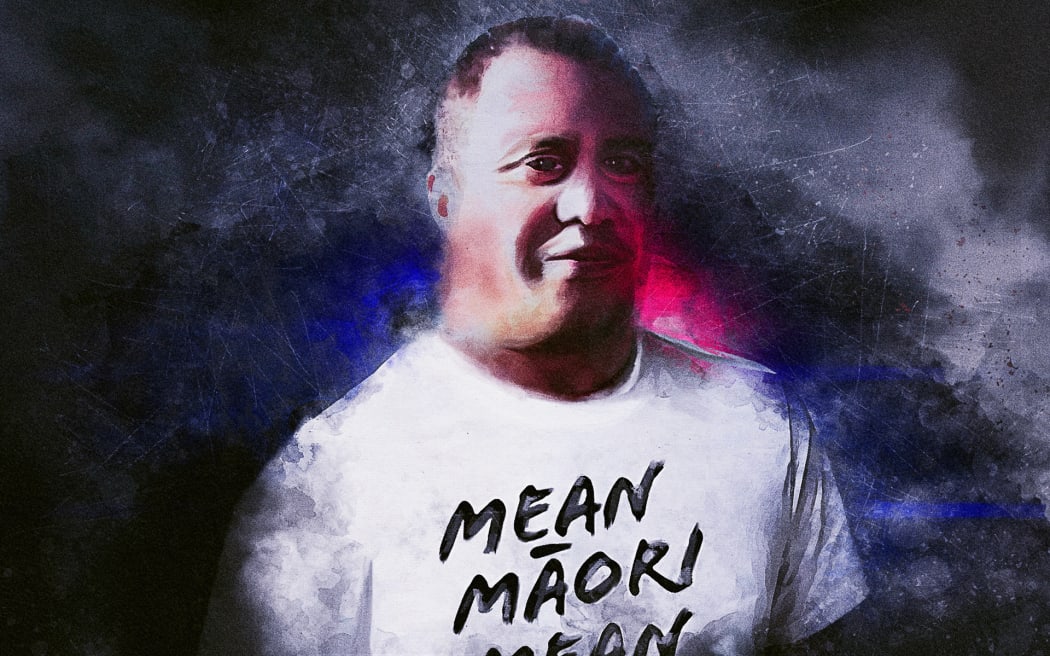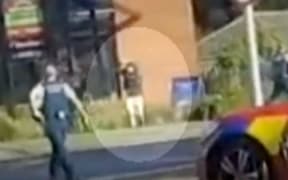The whānau of a man who was fatally shot by police was blamed for leaking court documents by a coroner, despite there being no evidence the whānau had done so.
The Crown Solicitor, acting for the police, also blamed the whānau for leaking to the media and argued they should not receive any new evidence about the death of their son, Shargin Stephens, with the coroner recording the reason being because "one or more members of the Stephens whānau cannot be trusted to treat the evidence provided as confidential".

Shargin Stephens was killed in 2016 Photo: RNZ/Vinay Ranchhod
The treatment of the Stephens whānau at the hands of the justice system can be revealed today after a year-long gagging order imposed by Coroner JP Ryan was lifted by a High Court judge following legal action by RNZ.
The media ban, known as an interim non-publication order, was imposed by Coroner Ryan on 24 June, 2021, two days after RNZ published The Untold Story of How Police Shot Shargin Stephens.
The RNZ investigation revealed major discrepancies between the police's homicide inquiry into the 2016 shooting in Rotorua and the evidence police gave the Independent Police Conduct Authority (IPCA).
Those revelations led the IPCA to conduct a fresh investigation. In a major U-turn the IPCA ruled that for police to bail check Stephens 70 times, often late at night, in the 38 days leading up to the shooting, was "excessive and unreasonable" and may have contributed to him lashing out (Stephens attacked an empty police car before he was shot).
But Coroner Ryan's reaction to RNZ's initial investigation was to impose a media ban on the case at the request of police.
The ban extended to any evidence given or submissions made as part of the coronial inquiry into Stephens' death and also to minutes issued by the court and memos filed by lawyers.
Such was the breadth of the ban that even the coroner's minute outlining the reasons for his decision was to be kept secret.
RNZ took legal action to have the prohibition order lifted. While the police originally opposed RNZ's action, it dropped its opposition a few days before the case was to be heard in court.
With the media ban lifted RNZ can now reveal that it was the police who sought the non-publication order.
Coroner's documents show that Crown Solicitor Amanda Gordon, acting for the police, sought an interim order "suppressing all the evidence provided in this proceeding until further order of the Court".
She claimed that RNZ's reporting of the "employment and work histories" of two officers meant "a limited class of people could piece together" their identities.
Gordon blamed the Stephens whānau for leaking information to the media, although she had no evidence to support this saying "it can only be inferred".
Coroner Ryan records Gordon saying that because "the Stephens whānau cannot be trusted to treat the evidence provided as confidential" no new evidence should be given to them.
Coroner Ryan did not agree to this but did make 13 members of the Stephens whānau sign a statement promising not to provide any new evidence to the media.
"If new evidence is disclosed to the whānau representatives, they will be put on notice that if they disclose that evidence to any person who is not an interested party in this inquiry they may be subject to proceedings for contempt of court," he warned.
The assumption from Coroner Ryan and the Crown Solicitor that the Stephens whānau had leaked material came despite submissions from the family that neither they, nor their two lawyers, had spoken to RNZ.
They provided an email from Shargin Stephens' sister showing she had declined a request from RNZ for an interview.
"When Shargin was shot, during his hospitalisation and after his death I made express instruction to all whānau that no media contact or exchange be entered into. That instruction still stands," the email said.
Coroner Ryan said he accepted assurances that none of the lawyers involved in the case had leaked information.
"The only logical conclusion is that a member of the Stephens whānau has provided Mr Espiner with a copy of documents contained in the Inquest Bundle," he wrote.
Coroner Ryan imposed the non-publication saying he was relying on "the interests of justice and personal privacy".
"I am also satisfied that publication of any evidence is likely to have a seriously deleterious effect on the mental health state of the police officers involved, based on information provided to me. I consider that the police officers involved in this incident have a reasonable expectation of privacy in relation to their actions until this matter is heard in open court."
RNZ has not named any of the officers involved in the shooting and those names were already suppressed under a May 2019 ruling by another coroner.
The coroner's ruling also reveals that QC Susan Hughes, acting for police officers involved in the shooting, wanted the coroner to order RNZ to remove its original investigation from the internet.
"A request was also made by Ms Hughes that I direct that the article published on the Radio New Zealand website be taken down," the coroner said.
He said he didn't think he had the power to do that but had asked the Ministry of Justice media manager to discuss the situation with RNZ "and strongly encourage them to take the article down on the basis that publication of evidence during an open inquiry in principle may be a breach of common law."
He said that "a responsible media organisation should attempt to mitigate the potential breach by removing the offending article".
RNZ did not remove the article and was never asked to do so.
In fact when RNZ approached the Ministry of Justice media advisor for clarification he said the suppression order did not apply to the story already on RNZ's website.
The Stephens whānau has been fighting for a full inquest into the shooting but Coroner Ryan has ruled only a narrow inquest is needed because the IPCA had already established much of what happened.
Lawyers acting for the whānau sought a judicial review in an attempt to broaden the scope of the inquest. Documents relating to that legal action were also suppressed under the media ban on reporting of the case. But that too has now been lifted.
The application for judicial review was dismissed by Justice Harland on 26 April but the judge did ask the coroner to "revisit the scope of the inquiry" in relation to bail checks.
"In all other respects, I uphold the Coroner's decision to limit the scope of the inquiry by relying on the IPCA report, so as to avoid duplication of inquiries," Justice Harland ruled.
The Stephens whānau are still waiting for a date for a Coronial Inquest nearly six year after Shargin Stephens was shot.




